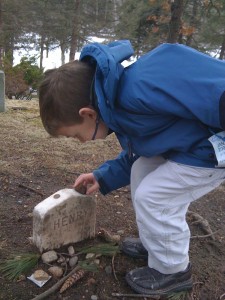The Transcendental Traveler
Retracing the Footsteps of Emerson and Thoreau in Concord, MA

A tiny tribute to a great writer and philosopher
To historians, Concord, MA plays a key role in the American Revolution, along with its neighboring town of Lexington. It was here that the first battle of the Revolutionary War was fought, at the Old North Bridge.
For writers and philosophers, however, another conflict in the mid-1800s― one of religious thought: Transcendentalism―took hold in Concord, began by Ralph Waldo Emerson, lived out by Henry David Thoreau, and embraced by many other authors at the time, including Louisa May Alcott, Emily Dickenson, Nathanial Hawthorne and more. The movement inspired new ideas about God, nature, and self-reliance, and with them, great literary works ―not unlike the explosive confluence of ideas and art during the Italian Renaissance.
Whether you are an avid believer of Transcendentalist ideas, or simply intrigued in the literary works and life-changing ides of these gifted writers, you will find a one-day excursion to Concord truly inspiring. Here are a few highlights you can see in just a half-day’s time. I recommend that you make your pilgrimage to Concord in late winter or early spring, when sites are quiet and serene, and you can step back in time and reflect, without the din and distraction of tourists.
If travelling by car, start your visit at Walden Pond, located just a few miles south of Concord Center. This three-mile pond, now a state reservation, is the site where Henry David Thoreau undertook his experiment to “live deep and suck out the marrow of life.” At the end of the parking lot (admission is $5.00), you’ll find an exact replica of the Thoreau’s one-room cabin, consisting of a bed, desk, woodstove, table, and three chairs — “one for solitude, two for friendship, three for society.” He built the cabin himself at an itemized cost of itemized the cost of $28.12 ½. He lived there for two years, two months and two days.
The 1.5-mile trail around the pond (approximately an hour’s walk ) will not only lead you to the site of the original cabin, but perhaps transport you back to the days that Thoreau went to Walden, “not to live cheaply nor to live dearly there, but to transact some private
business with the fewest obstacles.”
After your walk, head into the center of Concord, a town rich in history and beguiling to any traveler. At the center of the town is a park, where Monument Square looms high; a 5-10-minute walk east long Lexington Road will take you to numerous literary historical houses of note, including Ralph Waldo Emerson’s house, (open Thursday-Saturday 10:00-4:30 pm; Sunday 1-4:30 pm, admission $7) the Concord Museum across the street, which houses furniture from Emerson’s study as well as the largest collection of Henry David Thoreau’s artifacts (open Monday – Saturday 9:00 – 5:00; Sunday 12:00 – 5:00 admission $10) the Orchard House (where Lousia May Alcott wrote Little Women), and The Wayside, which was inhabited by The House of Seven Gables author Nathanial Hawthorne.
If time is short, choose one or two of these museums, then head up the hill ( a short walk) toward Sleepy Hollow Cemetery, where you can venture up to Author’s Ridge to see the gravesites of Thoreau (a fittingly small marker), Emerson (an imposing rough boulder of marble), Louisa May Alcott, and Nathaniel Hawthorne. Many family members are buried alongside these famous authors, including the grave of Ralph Waldo, wife Ellen Tucker, daughter Ellen, and five-year-old son, Waldo.
Walk back to the Town Square and visit the Colonial Inn at the far end, the original home of Dr. Timothy Minot during the American Revolution and later, home to Thoreau’s grandfather.
You can have High Tea on Sundays or Informal Tea on other afternoons, enjoying hot steaming brew and scones after your Transcendental walk around Concord. For a more informal, but equally delicious respite, head to Main Streets Market and Café around the corner.
This street is lined with many eclectic shops and boutiques for diverse interests. The Main Streets Market is famous for their spicy hot butternut squash chili and cornbread. Or you can opt for hot coffee with dessert, or a full meal from their generous lunch or dinner menu.
You’ll find plenty of other travelers enjoying a hot meal and invigorating conversation at the café, much like the great thinkers and writers of the Transcendental Movement likely did at similar establishments, over 150 years ago.
 My professional experience includes leading the creative efforts of three companies I have co-owned. I'm a seasoned copywriter/creative director, award-winning journalist, avid runner, and mom of four. Got a story idea you'd like to share? Email me at treske@nowspeed.com. You can also find me on Twitter: @trishreske, LinkedIn and Facebook.
My professional experience includes leading the creative efforts of three companies I have co-owned. I'm a seasoned copywriter/creative director, award-winning journalist, avid runner, and mom of four. Got a story idea you'd like to share? Email me at treske@nowspeed.com. You can also find me on Twitter: @trishreske, LinkedIn and Facebook.